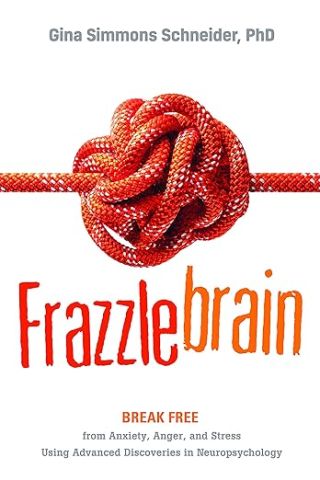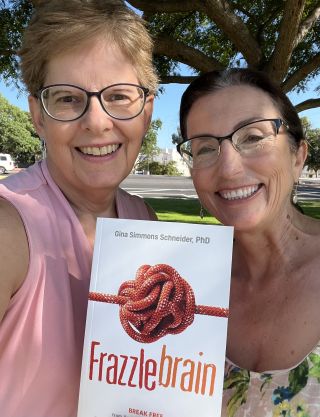Stress
Tamp Down That Frazzled Feeling
Fix those frayed edges with improved daily habits
Updated January 13, 2024 Reviewed by Lybi Ma
Key points
- Acting intentionally, we can eat healthy, exercise, practice patience, and live curiously to aid our growth.
- While grudges and revenge ravage our well-being, kindness and positivity provides the path to well-being.
- Oxytocin impacts the brain, easing fear and stress, in nursing moms, pet owners, friends, and lovers.
When Gina Simmons Schneider, Ph.D. once worked as a youth recreation coordinator, her mind raced with details for the beach trip: Snacks, boogie boards, permission slips, sunscreen, water, first-aid kit. A lot of responsibility. Cody and his little brother were regulars in a program that was a huge help to their disabled, single mom.
Sensing his leader’s intense focus, Cody ran down, “Fifty-seven, fifty-eight, fifty-nine…it’s a brand, new minute,” said with a twinkle in his eye. That levity launched Dr. Schneider into a laugh. “You’re right Cody,” she replied. “It is a brand, new minute so let’s make the most of it.”
In Frazzlebrain: Break Free from Anxiety, Anger, and Stress, Schneider tackles stress-filled feelings that every single human experiences, sometimes in excess, when life routes us through daily (or extraordinary) tasks.
The author knows well how to help with frustration. She and her husband Jay Schneider, LCSW, wrote Manage Anger Daily Meditations, available on Amazon Music.
Frazzlebrain provides a quiz at the outset to help you determine your frazzled state. Then, it offers a template for understanding, easy-to-implement tools, and handy hacks to springboard hope, optimism, and happiness.

We learn how to soften responses to stress and why stress, bitterness, and a revenge-seeking mindset harm our health and relationships. Then, it’s on to cultivating real tools: patience, self-soothing using your five senses, self-confidence versus self-criticism, hope, imagination, positivity, nature moments, and mindfulness.
Schneider cites much research, numerous studies, and an abundance of experts. Ian McKee, an Australian social psychologist, found that “people who are more vengeful tend to be those who are motivated by power, by authority, and by the desire for status. They don’t want to lose face.” Hence, they choose pride and dominating others over contentment and having greater social connection.
The author provides a 12-question cynical hostility checkup revealing that cynics die earlier, suffer more dementia, complicate physical healing, and have higher interpersonal conflict. If we think and adopt positive habits, we can halt these slides. Schneider inspires us with antidotes of people who have done just that.
Frazzle Hacks
“Cynical hostility stresses your nervous system and fuels frazzlebrain,” Schneider writes. “Compassion, in contrast, helps you feel calmer and more in control of your emotions.” Compassion aids mental flexibility. Positive affirmations tamp down negativity. Hope leads to problem-solving for health crises, job loss, relationship quandaries, and many frazzled life experiences where you can succeed.
Each chapter starts with an inspiring quote and boasts hacks set off as sidebars to feel less frazzled.
The Body-Mind Connection
Midway through Frazzlebrain, we learn that changes in our gut microbiome can occur in as little as 24 hours after we intentionally change the way we eat and our diets, rendering stronger immunity, more nutritional value and lowered risk of GI and other diseases.
"Gut bacteria manufacture about 95 percent of the body’s supply of serotonin,” writes Schneider, who adds that serotonin plays a key role in treating anxiety and depression.
Nature for Healing
Blue spaces such as lakes, rivers, streams, and oceans — just wandering near them — improve mental health and lower stress. Forests and green spaces also promote relaxation. The Japanese call this forest bathing. Take walks to enjoy natural beauty, hear the water’s waves or the wind rattling trees, notice the colorful birds, sniff the salt air or essential wood oils (phytoncides).
A day at an aquarium, a nearby zoo, gardening outdoors, or placing plants in your home is enough to activate the body’s self-calming mechanisms. When we work outside, getting in the dirt a little, we are one with nature and often create patches of beauty with lawn care, tending to shrubbery, or potting herbs.
We all know that the quality nonverbals that pets share with us lower our blood pressure and reduce the stress chemical cortisol. Owning, caring for, and simply being around pets increases our oxytocin and improves our mood. Certainly, the pet’s mood benefits, too; dogs, especially, are social creatures.

Relationships Change the Brain
Human bonding comprises a large facet of life. Sadly, there are traumatic bonds, but we hope over the years to add nurturing, thriving relationships to our lives. Friendships, acquaintances, and partnerships have their ups and downs, complications, and comfort. As Schneider writes, “Our relationships shape the growth of connections in the brain. Neurons (brain cells) and neurotransmitters (brain chemicals) activate and change based on our experiences with other people.”
Three components of healthy relationships include gratitude, amplifying what’s good, as well as maintaining commitments that add significance and meaning.
The final chapters in Frazzlebrain fill us with you-can-do-this, steps toward forgiveness when needed, and goal-setting tips. A daily calming plan with focused thoughts, intentional behaviors, and healing experiences. Since there are times when having specific support helps us to lower stress, Schneider outlines types of mental health professionals and physicians for medication.
I can’t think of a better resource for back to school, the holidays ahead, or sustenance in our work lives and relationships.
Copyright © 2023 by Loriann Oberlin, MS
References
Schneider, Gina Simmons. Frazzlebrain: Break Free from Anxiety, Anger and Stress Using Advanced Discoveries in Neuropsychology (Las Vegas: Central Recovery Press, 2022)




